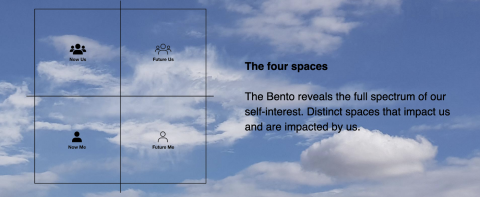What are the qualities of a wicked problem?
They're personal, difficult, complex, and make us feel very conflicted.
The original post is here: https://medium.com/foolish-journey/hello...Hello Kevin,
I’m 100% on board with thinking about wicked problems starting from the personal and moving out to the more intimidating problems facing the world. I am thinking that it’ll help us to have our own easy-to-reference (and expand, if necessary) guide to wicked problems, so I’m gonna take a stab at it right now. I took all of the various lists of qualities from the Wikipedia page and tried to combine them and group them into somewhat coherent categories.
PERSONAL: We can’t avoid the problem
- Personal. The problem affects us directly, but can’t be solved on our own. Not urgent. Most of the impact is in the future, making it easy to delay treating it urgently right now. And yet, time is running out to implement potential solutions.
- Getting worse. The problem gets harder to solve as time goes on. The effects of the problem and the resources needed to solve it increase over time.
- Existential. The problem is ultimately fatal if left unaddressed.
DIFFICULT: The solutions require incredible investment up front
- Expensive. Every solution to a wicked problem, if they can even be imagined, is exorbitantly expensive.
- Unconvincing. Proposed solutions that some think are good also spark great resistance from others. The ideal problem solvers are out of contact with the problems and potential solutions.
- Uncompromising. Multiple solutions can work against each other, making it hard to execute on several at once.
COMPLEX: The problem is hard to pin down
- Unique. Every wicked problem has unique qualities that differentiate it from all previous problems it might be compared to.
- Multifaceted. The scope and consequences of the problem can’t be fully understood from a single perspective. There’s no single holistic view of the entire problem.
- Ambiguous. Different interpretations of the problem will generate contradictory solutions.
- Systemic. There are numerous possible intervention points. No single intervention will solve the problem once and for all.
- Interconnected. Most problems are symptoms of solutions to past problems, and most solutions will create new wicked problems while exacerbating existing ones.
- No accountability. There’s no central authority responsible for the problem or for solving it. Affected parties have radically different world views, different frames for understanding the problem, and will be hurt by it to varying degrees.
CONFLICTED: There’s vast disagreement about viable solutions
- Complicit. Those seeking to solve the problem are also directly or indirectly benefiting from it in some way.
- Unviable. Ideological constraints, cultural constraints, political constraints, and economic constraints make proposed solutions unviable.
- Unpredictable. Some solutions include worst case scenarios that are worse than the problem, and oftentimes more immediate. Most predictive models of the problem generate unreliable predictions.
- Unmeasurable. Data about the problem is often uncertain, ambiguous, or missing. Unintended consequences of proposed solutions are difficult to estimate or prevent before fully implementing them.
As you know, I’ve been thinking of these wicked problems in context of the hero’s journey and in my head the wicked problem is a 🐲 DRAGON 🐲 that the 🦹♀️ HERO 🦹♂️ has been sent to slay. Of course, they will fail. We will fail. But we can think of at least a few kinds of dragons that we will fail to slay.
- LEVEL 1 DRAGON BOSS: A personal wicked problem: if we fail to solve the problem, we suffer mostly alone. Mostly, these wicked problems will have most of the qualities listed under PERSONAL and DIFFICULT, but only a few of the ones under COMPLEX and CONFLICTED. For example, how can I live a life that I don’t regret?
- LEVEL 2 DRAGON BOSS: A cultural wicked problem: if we fail to solve the problem, our culture / community / tribe will suffer together. These will have most of the qualities of a wicked problem, but might not have all of them. For example, how can we preserve our cultural traditions and history in the face of decreasing resources and adversarial forces?
- LEVEL 3 DRAGON BOSS: A global wicked problem: if we fail to solve the problem, everyone will suffer together. These problems will have all of the qualities of a wicked problem. For example, how can we minimize the chances of global societal collapse caused by climate change / asteroid impact / nuclear proliferation?
And a bonus META DRAGON BOSS. You hinted at an interesting theory about how our inability to properly address LEVEL 1 DRAGON BOSSES could exacerbate LEVEL 2 and LEVEL 3 DRAGON BOSSES by simply decreasing our effectiveness at contributing productively to them. At the same time, you may also have identified a strategy to help us address all of them, similar in structure to Maslow’s Hierarchy of Needs (though I know there are more accurate models of this out there now, and it’s better to think of them as spirals or networks than pyramids). What I’m trying to say though is that the way to beat LEVEL 3 DRAGON BOSSES is to first get a handle on the LEVEL 1 and LEVEL 2 DRAGON BOSSES.

And this in turn reminds me of the link Vicki Tan shared in the Rickshaw Discord today about Bentoism.

I’m trying to stick to my “finish the post in one sitting” rule that I’ve arbitrarily set for myself, so I’ll leave you here and ask for your thoughts on this overall framing of the wicked problem. Are we making progress? What’s still missing? What comes out of this exploration next?
Buster